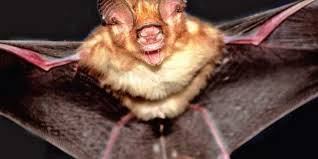Kolar Leaf-Nosed Bat | 30 Dec 2020
Why in News
The Karnataka Forest Department, along with the Bat Conservation India Trust (BCIT), is getting prepared to save the Kolar leaf-nosed bat from extinction.
- BCIT is a non-profit organization which was conceived for the protection of bat species in India by protecting their habitat. It is headquartered in Bengaluru, Karnataka.
Key Points
- Scientific Name: Hipposideros hypophyllus
- Geographic Range: It is endemic to India. It is presently known only from one cave in Hanumanahalli village in Kolar district, Karnataka.
- Threats:
- Habitat loss from land use change, hunting, and stone quarrying in the region.
- Till several years ago, the Kolar Leaf-Nosed Bat was found in only two caves in the village of Hanumanahalli. For reasons that are still unknown, the bat became locally extinct in one of the two caves.
- Protection Status:
- IUCN Red List: Critically Endangered
- Wildlife Protection Act, 1972: It has not been accorded legal protection under the Act.
- Conservation Efforts:
- The government had notified the 30 acres around the caves as a protected area.
- Any development work here, including construction of new infrastructure, will need the permission of the National Board for Wildlife.
- The Bat Conservation Indian Trust has been awarded a grant to conduct further research on this species of bats.
- It is running an intensive awareness campaign in the nearby communities and they have come to understand the threat to the species and have started guarding this area from encroachers.
- The government had notified the 30 acres around the caves as a protected area.
- Concerns:
- Bats are one of the least studied mammals in the country, though there are 130 species in India.
- Bats are vital for the ecology as they are pollinators, their main diet being nectar.
- Bats also help in insect control and therefore, help in the protection of crops.
- They are very adaptable creatures and therefore can often be found near human habitation or even in urban settlements, which makes them vulnerable.
- They also have a bad image in the public eye, as carriers of diseases.
- Bats are one of the least studied mammals in the country, though there are 130 species in India.
- Suggestions:
- There is an urgent need to curb illegal granite mining and quarrying within five to ten kilometre radius of the roost (resting-place) to ensure the quality of other subterranean caves in the area.
- Meanwhile, widespread cave explorations and acoustic sampling are recommended to understand the distribution of the species.
